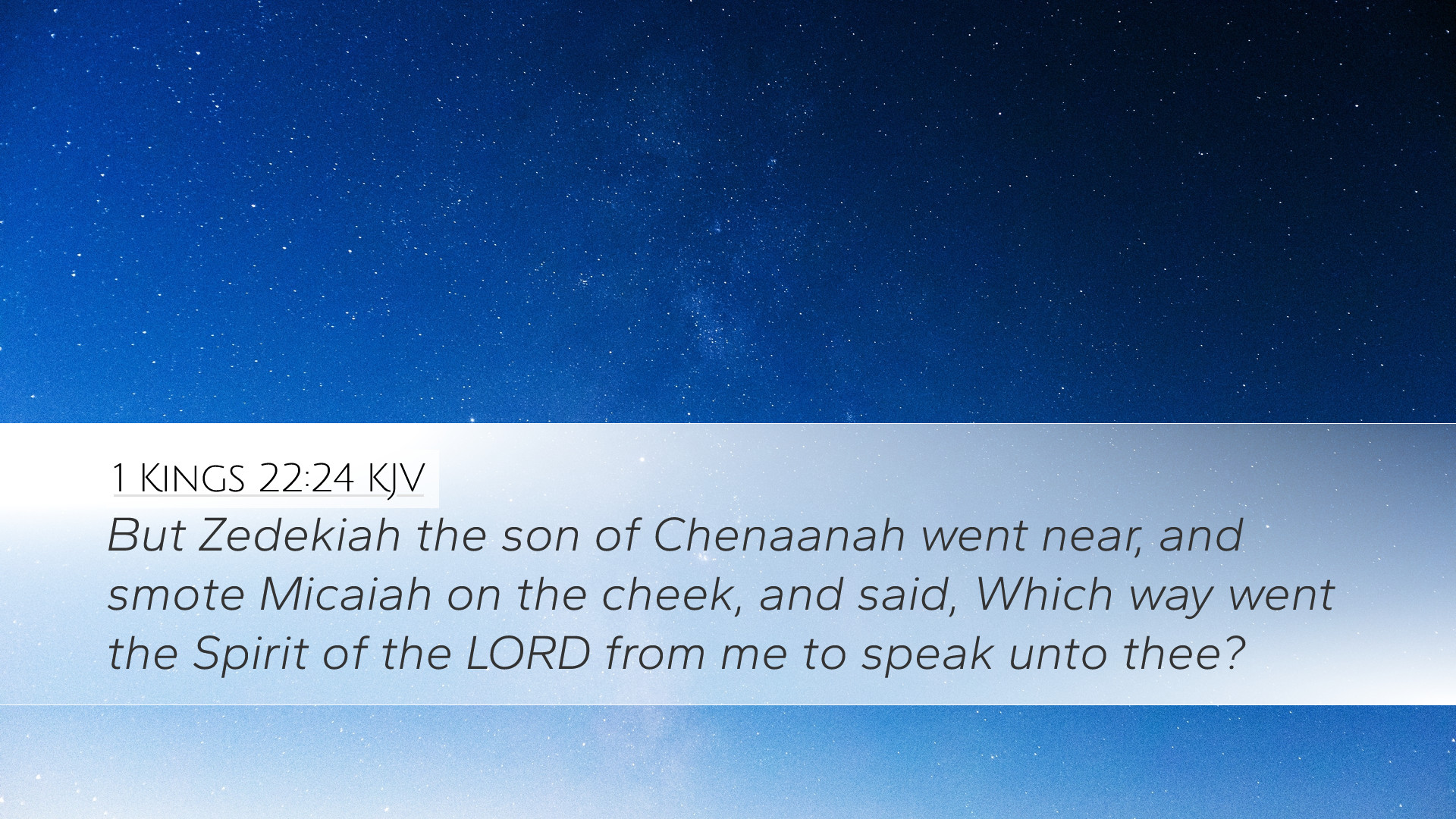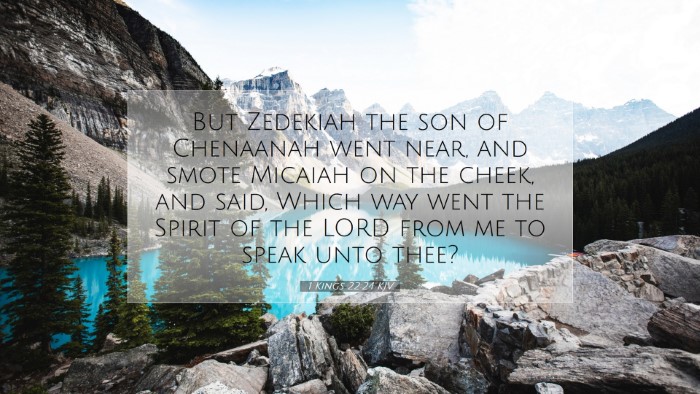Commentary on 1 Kings 22:24
Text of the Verse: "But Zedekiah the son of Chenaanah went near, and smote Micaiah on the cheek, and said, Which way went the Spirit of the LORD from me to speak unto thee?" (1 Kings 22:24)
Introduction
This verse presents a tense moment in the narrative of King Ahab and the prophet Micaiah. The backdrop is a critical moment where the king seeks counsel regarding the impending battle at Ramoth-gilead. Prophets were called to speak on behalf of God, and their messages often bore heavy consequences. The actions and attitudes displayed in this passage reveal the conflict between God’s truth and human opposition to it, especially among those in power.
Historical Context
The events in 1 Kings 22 are set against the complicated political landscape of Israel and Judah. Ahab, the reigning king of Israel, is often depicted as an egregious example of disobedience to God. The prophet Micaiah serves as a solitary voice of truth among a collection of false prophets, led by Zedekiah, who sought to curry favor with Ahab.
Exegesis
The primary focus here is on the interaction between Zedekiah and Micaiah. Zedekiah's act of violence towards Micaiah signifies a personal affront not only to Micaiah as a prophet but also to the message he represents. It embodies the rejection of divine authority and truth.
Insights from Matthew Henry
Matthew Henry emphasizes that Micaiah's unwavering stance in the face of intimidation embodies the integrity of true prophets. Despite the surrounding falsehood, he remains committed to delivering God’s message, indicating that true prophecy stands in stark contrast to popular opinion. Henry notes that Zedekiah represents the “spirit of delusion,” as he perceives himself to be the one receiving divine inspiration, though in reality, he has strayed far from God.
Insights from Albert Barnes
Albert Barnes discusses the implications of the confrontation symbolized by the act of striking Micaiah. This act illustrates the lengths to which individuals would go to defend their own deception. Barnes identifies this scene as crucial in demonstrating the conflict between truth and lies, implying that violence is often the last recourse for those wanting to suppress the truth. He also denotes the irony that Zedekiah, despite physically assaulting Micaiah, could not change the prophetic message that had been delivered.
Insights from Adam Clarke
Adam Clarke's observation on the phrase “Which way went the Spirit of the LORD from me to speak unto thee?” highlights Zedekiah's confusion or feigned ignorance about the source of his spirit. This query not only reveals Zedekiah’s lack of awareness of God’s workings but also his reliance on his own strength rather than divine instruction. Clarke interprets that this act and question reflect a tragic disconnect that can occur when one is ensnared by pride and self-deception.
Theological Implications
The struggle displayed in this passage offers profound theological insights. Firstly, it demonstrates the uncompromising nature of God’s truth amidst human defiance. The boldness of Micaiah serves as a reminder to believers that faithfulness in proclaiming the truth is crucial, even in the face of violent opposition or overwhelming societal pressure.
The Role of Prophets
The prophet in Israel was a mediator of divine revelation; thus, Micaiah's position was significant. No matter how hostile the environment became, the role of a prophet called for unwavering fidelity to God’s message. This is an encouragement for pastors and theologians to uphold the integrity of the Gospel message even amidst adversities.
The Consequences of False Prophecy
This passage also serves as a stark warning against following false prophets. The consequences of Ahab's choice to trust in Zedekiah and his companions rather than Micaiah lead to his ultimate demise. The church today faces similar challenges, where discernment is necessary to differentiate between true shepherds and those who lead with a spirit of deception.
Applications for Today
- Speaking Truth to Power: Like Micaiah, it is essential for those in ministry to voice God’s truths regardless of potential backlash.
- Resisting Intimidation: The intimidation Micaiah faced from Zedekiah illustrates the pressures believers may face. It highlights the need for the church to foster environments where truth can be freely expressed.
- Discernment: Encouraging sound doctrine and discernment among congregations is vital to withstand the influences of contemporary false teaching.
- Clarity in Divine Calling: Understanding one's prophetic or pastoral call is crucial and should be rooted in prayer, scripture, and community support.
Conclusion
The tension encapsulated in 1 Kings 22:24 serves as a powerful reminder of the challenges faced by prophets throughout history and the continuing need for believers to uphold truth in an age where falsehood may appear more palatable. This commentary encourages reflection on the nature of divine revelation, the courage required to stand firm in faith, and the diligence needed in discerning God’s voice amidst many others.


